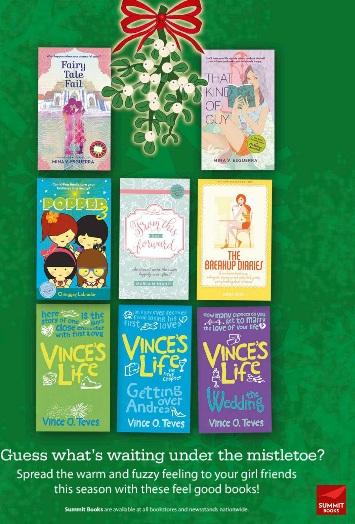Guess what: I do!
When I say traditional publisher I mean the companies that accept manuscripts, publish books, and handle its distribution and marketing. I got my first break via a traditional publisher -- Summit Books -- and that gave me the confidence to keep writing, which eventually led me to decide to independently publish.
I recently gave my traditional publisher Philippine print distribution rights for my self-published stuff, and these are the advantages to that:
1. Access to a new pool of professional editors and designers

I work with professional editors and freelance designers when I self-publish, usually my friends and people I know, but it helps to have the book be read, worked on, and designed by people who move in totally different circles. The stories of Fairy Tale Fail and Love Your Frenemies didn't change much, if at all, but I did enjoy their different takes on the covers and the back cover blurbs.
2. Bookstore presence and visibility

"I can't find [insert self-publish book here] in the bookstores." I get this a lot. The huge gap in my own indie publishing operation is that I don't work with local bookstores to place my books there. I just see it as a lot of work, and I haven't found a way to do it quickly and simply just yet.
And this is where traditional publishing absolutely works for me, because they make sure that their books are present in as many bookstores as possible. We can discuss Philippine readership and whether books should be marketed more and whose responsibility is that, but this I know -- I get more readers in the Philippines when I have a book on the shelf of a bookstore.
3. Advertising in traditional media

This was an ad in the December/January issue of Candy magazine, which I would have never been able to manage on my own. I have to say, Summit really has a handle on the market for my books, so I appreciate it whenever they do something extra to reach out to readers.
As it is now, I actually decide on traditional vs indie one book at a time. And sometimes, I don't have to decide at all, because even books that I've "made indie" were picked up by a traditional publisher. I feel absolutely blessed/lucky/fortunate to be in this position, but I think that the indie mindset has also helped -- knowing that I have to work on a book as if I were publishing it has maybe made it easier for a traditional publisher to find something to like about it.
What does that mean, by the way, to write a book as if you're publishing it? I think that deserves its own post.

Hurray Mina. I think what you are doing is great. you are in so many ways encouraging Filipino writers to come out of their shelves and see the light.
ReplyDelete